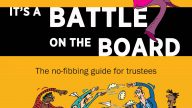By the time the sh*t gets to the top it’s really stinky
In this latest article, Debra Allcock Tyler shares the difficulties in being a charity CEO.
Many years ago, as per DSC’s practice, one of my Directors at DSC had the opportunity to be Acting CEO whilst I was on leave.
On my return, we had a hand-back conversation and I asked him what he had learned. His reply is now legendary. He said, ‘I’ve learned that by the time the sh*t gets to the top it’s really stinky’. It made me laugh out loud as it was so very accurate.
I spend a lot of time with CEOs, both those completely new to the post and those who have been around a long time. And I’ve been a CEO myself for 23 years. And there is one common thread – it is a really hard, lonely and stressful job.
And I think that many of us launch ourselves into our first CEO roles sort of knowing that but not really understanding how it feels and how to handle it. With experience you get used to it – but it doesn’t really get easier. When you’re not the CEO it’s easy to look at your current CEO and believe that you could run things so that everyone was happy and everything would go well. And then you get there and realise that there are a million and one issues that you were previously blissfully unaware of – and none of them is easy to navigate!
It is not like any other job. Yes of course there is joy and satisfaction in it. But the pressures are immense – not necessarily because they are being dumped on you – but because the very nature of the role means that you are accountable for everything. And yes, I do mean everything.
And you will be blamed for everything – fairly or unfairly. Staff unhappy? Your fault. Board pissed off? Your fault. Funding not coming in? Your fault. Beneficiaries unhappy? Your fault. Poor staff performance? Your fault. Bad press? Your fault. Loos not working? Your fault.
It’s often unfair – but it is the reality. And you have to be able to deal with it. No matter how lovely and values-driven a leader you are your primary duty is the survival and thrival (I know that’s not a real word – but it is now!) of the charity on behalf of the Board. And that means you are going to have to make decisions that some people hate – or implement board decisions that you don’t like either and which folk will also hate. And you just have to suck it up.
The nature of the role also means that you will find work-life balance really challenging – again not because you’re necessarily being given too much to do (there’s always too much to do and not enough resources in every role in every charity!) but because you will find yourself constantly aware that you are the accountable person, so you will worry about work in the middle of the night, at the weekend and on holiday, because you care.
Even though you can (and absolutely should) network with other CEOs who can share your pain, when push comes to shove it is still only you facing the Board and the staff. Even with a great, supportive leadership team and board, it’s still ultimately only you.
And whilst you can and should seek and pay attention to feedback, you have to remember that it is not your job to please your staff but to deliver the charity’s objects on behalf of the Board. And that means sometimes people won’t like you.
So if you’re finding it hard it’s because it is hard, not because you can’t handle it.
But you can learn skills to make it more bearable. These will all help:
- Women in Leadership – Online conference on Thursday 12 September
- From Here to Diversity – Online conference on Thursday 26 September
- It’s Tough at the Top: Good Leadership Matters – Online conference on Wednesday 27 November 2024
- It’s a Battle on the Board
- It’s Tough at the Top: The no-fibbing guide to leadership


